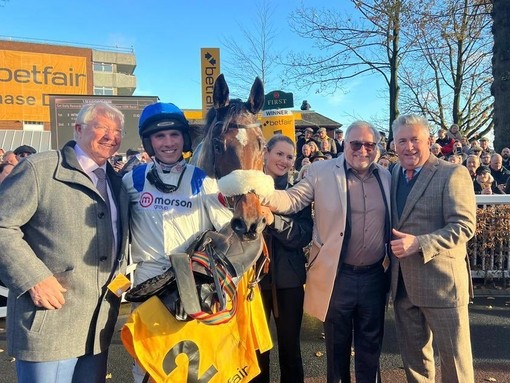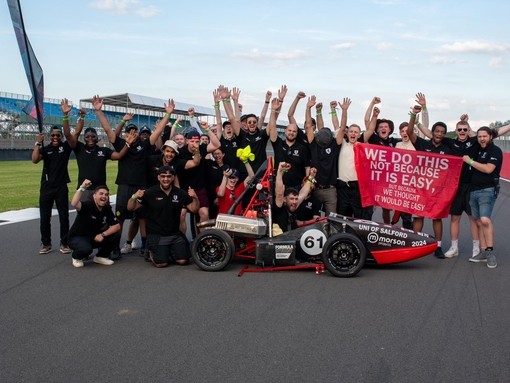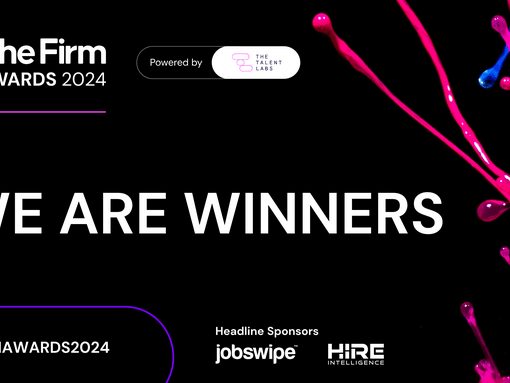
Dr Maria Stukoff: Storytelling, exploration and videogames to nurture future STEM talent
Dr Maria Stukoff is Director of the Morson Maker Space at the University of Salford. With a passion for exploration, animation technology and video games, Maria’s career has one unifying theme - a love for nurturing and developing the next generation of STEM talent.
For National STEM Day, we spoke to Maria about her story – from an education that saw her spend time across three different countries, to working as the Head of the Global Academic Development Programme for video game giant Sony PlayStation and to her current role as the Director of the Maker Space at the University of Salford.
Watch her interview below:
My early years growing up in education were diverse because I started my school years in Devonport in New Zealand, then travelled to Germany for most of my schooling, before going back to New Zealand to do my GCSEs. And then I went to Australia to finish off my high school.
What did you want to be when you grew up?
I really wanted to be an astronaut! For me, it was this idea that you could travel outer space, discover all these new worlds. I was very into fantasy and sci-fi films and books. The idea that I could go out into the other worlds was really, really exciting.
The other option was for me to be a deep-sea diver. Living in Australia by the coast, for me to go under the sea was also a world to be discovered. The idea that I wanted to be an explorer in some sense was really, really strong… and in a weird way, it was kind of what led me to what I do today.
What did you enjoy as a child?
I’ve always enjoyed playing videogames, like Mario. My nickname was Mario when I was in my first university. I love playing Mario because I also like going off-piste just to see to where I was going. I really enjoyed all the characters, the animation, and it really was more about having fun rather than having to perform and win. And I really like that sort of, environment to play with my mates and, and have that storyline.
I really loved animation, stop motion. What was really excited about stop motion is that you’ve got all these objects that you can manipulate. You can tell stories. And I think that element about storytelling and bringing your ideas and visions into play played a really big role in me then studying animation later down the line. I was excited to study computer animation and interactive media design. And for me, that gave me an opportunity to explore new technologies and learn the skills around digital animation. It allowed me to tell my stories and bring lots of different elements together to really test and trial how modern life is with technology.
Talk to us about your roles in the video game industry
My first job was really teaching and computer animation and game and media arts and web design. That then led me more into video games in a more commercial setting. It’s been quite interesting to see the development and the adoption of video games over the last, 25 years or so, how video games as a sector is now one of the most commercially viable industries. It has an income larger than film and music combined.
One of my first really big commercial jobs was working for Sony PlayStation. I was head of PlayStation First, which was the academic program. It allowed, young people who were in education or in university setting to get hold of the PlayStation hardware to program and make games for the actual PlayStation platforms.
I was there for seven years, and part of my role there was to make sure that we inspired young people to consider even a career in game development, to learn coding and computer animation to project management, game design, and all the other commercial business that sits around video games. In those years, I was very fortunate to set up incubation labs and work with graduate teams who then later create their first game for the PlayStation network.
I could be an astronaut, I could be a deep sea diver because I was working in virtual worlds, and virtual worlds could be anything that you could imagine.
My love for the moving image, stop motion animation, and my love of exploration really gave me my job where I could be an astronaut, I could be a deep sea diver because I was working in virtual worlds, and virtual worlds could be anything that you could imagine.
Stepping into video games was like, oh my gosh, this there’s an industry that combines all my interests!
How did you come to lead the Morson Maker Space at the University of Salford?
We’ve been very fortunate that, the University were actually looking to bring in some new technologies around digital, fabrication and additive manufacturing. They invested in establishing a Maker Space, which provides students and staff with the opportunity to explore technology as a way to find solutions to a problem.
It’s a tinkering space. It’s a place where people can come with ideas, use a vast range of materials, everything from electronics to 3D printing, laser cutting. It’s a place where you can dream big.
You can have some ideas about what you want to do and come here and actually test some of those ideas for your work. It’s a sort of a high spec garage where people can come to explore their projects. One of the key elements as part of the Maker Space is that we work very closely with industries, which is fantastic for students because they get to reach into the industry and can actually meet with industry professionals.
We’re very lucky that we also work with Morson Group, our partners here, who actually invest and support many of our different student programs here, from women in to engineering, right through to the youngest working with Primary Engineer to ensure that the youngest students actually understand what STEM is all about, but then also understand how they could also look towards studying here itself at university.
For the last few years, we’ve been running the Morson Group STEM Foundation right out of the centre of the Maker Space, and that has allowed us to have a much wider reach and community impact, working with the Morson Projects engineers so students can really see how future careers in STEM work.
The Morson STEM Foundation works to pave pathways into STEM for all, through funding, engagement and training. From early years engagement through to scholarship support, we aim to increase the talent pipeline for STEM by widening participation and creating pathways into education and training. Find out more here















